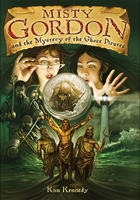I have already written something about Belisarius's uncle, Modestus, with his Roman ways and his strained rhetorical talk full of puns and recondite allusions. I met him once only, nearly sixty years ago, but my memory of that occasion was often afterwards refreshed by Belisarius, one of whose favourite diversions in private was to mimic Modestus and make my mistress Antonina laugh. I have also inherited a volume of Modestus's poems and another of his painfully composed letters, in the style of Pliny, both of which are inscribed with a dedication to Belisarius. Moreover, when I was in Rome during the siege I met many noble Romans who spoke and behaved in very much the same manner as he, so I know the type well.
The scene is the dining-room of Modestus's villa. There are present: Modestus himself, the burgess Simeon, Malthus the schoolmaster, three other local dignitaries, Bessas (a big, tough Gothic cavalry officer quartered in the town), Symmachus (an Athenian professor of philosophy), Belisarius, now fourteen years of age, with Rufinus and Armenian John and Uliaris and Palaeologus the tutor. Everything is arranged exactly in the old Roman style, for Modestus is an antiquarian and makes no mistakes: he can justify everything by quotation from some Latin author or other of the Golden Age. His guests feel a trifle self-conscious, especially Simeon, who is a convinced Christian and somewhat scandalized by the lasciviousness of the painted frieze that runs between windows and ceiling-the subject being Bacchus, God of Wine, on his drunken return from India. In deference to the wishes that Modestus has expressed in his letter of invitation, most of his guests are dressed, Roman-fashion, in long, white, short-sleeved woollen tunics. But the burgess Simeon is true to the smoky woollen blouse and loose pantaloons that every ordinary inhabitant of Thrace wears, who is not a cleric; and Bessas wears a linen tunic with broad vertical stripes of yellow, green, and red, and breeches of sewn skins, because he is a Goth. Bessas also wears a brownish-yellow military cloak fastened with a large amethyst brooch that sparkles magnificently when it catches the light.
They recline on couches at a round table of ancient sumach-wood; which Bessas finds awkward, being accustomed to sit up to the military board on a hard bench. He envies the boys, who, since they are not yet of age, are provided with chairs, not couches; they sit at a side-table. It is four o'clock now, by Modestus's water-clock, of which he is so proud and which keeps such poor time, and Greek servants bring in the appetizers-dishes of olives, chopped leeks, young onions, tunny-fish in vinegar, prawns, sliced sausage, lettuce, shell-fish. Malthus has been appointed wine-master, but Bessas's high military rank entitles him to the consular seat at the tip of the crescent in which they recline. Symmachus the philosopher resents that the principal honours should go to the brownish-yellow cloak of Bessas, a barbarian, rather than to his own grey professorial cloak; but does not dare to show his feelings openly.
Malthus's duty is to see that every man's cup is filled and to regulate the proportion of wine to water: it is a duty that he has often performed for Modestus. He can be trusted to whisper to the man with the wine-jar and water-pot 'More wine', when conversation is formal and frigid, and 'More water' when the conversation is becoming too free or quarrelsome and spirits need cooling. A hired dancing-girl supplied by the Theatre at Constantinople, with a wreath of roses on her head, bare legs, and a very short tunic, hands the cups around, making pretty jokes as she does so.
Now Simeon the burgess says something in a low tone to Palaeologus (who is reclining on his left), indicating the frieze with a critical inclination of his head. Palaeologus replies with a warning frown, and Modestus calls out: 'Hey, Sirs, is this proper banquet comradeship? Did not Petronius the Arbiter lay down hundreds of years ago in his famous satirical novel that at a courteous table all offensive comments should be made aloud? Come, let us have it! What do you find amiss with my frieze? It is a reproduction by a gifted contemporary copyist of a major work of Gorgasus the mural painter. The original was at Corinth, but is now destroyed, which makes this doubly precious to me and to all connoisseurs.'
Then he goes on, in a chanting voice: 'Observe how Bacchus, having ravaged India, the land where the sages, called fakirs, nude but for a loin-cloth, sleep (praying to their gods) supported by nothingness three feet above the parched serpent-haunted ground-how great Bacchus, ever youthful, is harnessing the tigers to his triumphal chariot, wreathed with vine-clusters, with vines for bridles! From his curly head sprout golden horns, symbol of valour, which themselves sprout lightning-that very lightning in which Jove begat him on astonished Semele. His smooth temples, you will notice, are adorned with poppies…'
'If I may be pardoned such a rude interruption of your charming and eloquent speech,' Malthus puts in-he sees that the guests, having drunk little so far, are growing restless at the prospect of a long, dismal, classical recital, and he knows the only way to silence Modestus-'those are not poppies, they are intended for asphodel. Poppies are proper to Morpheus and to Ceres and to Persephone; but asphodel to Bacchus. Gorgasus was too well-informed an artist to make such an error in floral attributes.' Then, hastily to the servant: 'Boy, pour again, and let it be all wine!'
Modestus apologizes: he meant asphodel, of course-'A slip of the tongue, ha, ha!' But his confidence is shaken; he hesitates to resume his recital.
Simeon considers that the half-clothed women of the frieze, in attendance on Bacchus, are not proper ornaments for a Christian dining-room. Looking up at them, one might imagine oneself inside a brothel at Tyre or Sidon or one of those heathen places, he complains.
'I was never a customer at any such haunt,' says Modestus sharply, 'but perhaps you know best. At the same time let me tell you that I regard the attitude to nudity as one of the tests of civilization. The barbarians hate the sight of their own unclothed bodies: just as the singing, illiterate, savage fraternities of monks do.'
Nobody takes up the challenge on behalf of the monks, not even Simeon, but Bessas answers stiffly: 'We Goths regard the sight of a person unclothed as ridiculous-just as you, Modestus, laugh at a person who cannot sign his own name-as many a noble Goth cannot do, I among them.'
Modestus, in spite of his crotchets, is a good-humoured man and does not want to pick a quarrel with a guest. He assures Bessas that he is surprised that a man with so noble a name cannot record it on paper or parchment.
'For what were Greek secretaries created?' laughs Bessas, ready to be appeased.
Next, Modestus tells his Thracian guests how proud he is, though a Roman of exalted rank, to be resident in Thrace, once the home of great Orpheus, the musician, and the cradle of the noble cult of Bacchus. 'Those naked women, Simeon, are your own ancestresses, the Thracian women who piously tore King Pentheus in pieces because he spurned the God's gift of wine.'
'My ancestresses all wore long, thick, decent gowns!' Simeon exclaims; and his indignation raises a general laugh.
While the appetizers are being cleared away, the dancing-girl gives a clever performance of acrobatic dancing. As a climax to her hops and skips, she walks about on her hands and then, curving her body into a bow and arching her legs right over her head, picks up an apple from the floor with her feet. Continuing to walk on her hands, and even slapping the floor with them in time to the apple-song she is singing, she pretends to debate with herself as to who shall be awarded the fruit. But her mind has long been made up: she lays the apple on the table beside young Belisarius, who blushes and hides it away in the bosom of his tunic.
Simeon quotes a text from Genesis, how Adam says: 'The woman gave me the apple and I did eat'; and Modestus a text from the poet Horace: 'Galatea, wanton girl, Aim an apple at me,' and everyone is surprised at the unanimity of sacred and profane literature. But the dancing-girl (who was my mistress Antonina) surprises herself by the sudden liking she feels for this tall, handsome youth, who looks at her with such fresh admiration as Adam is credited with having felt at the first sight of Eve.
Now, this liking came, I think, very close to love, an emotion of which my mistress's mother had always warned her to beware, as a hindrance to her profession. Antonina was nearly fifteen years old then, a year older than Belisarius, and had already lived a promiscuous life for three years, as public entertainers cannot avoid doing. Being a healthy, vivacious girl, she had thoroughly enjoyed herself and suffered no ill-effects. But amusement with men is an altogether different thing from love for a man, and the result of the look that Belisarius gave her was to make her feel not exactly penitent for the life she had been living-penitence is a declaration of having been in the wrong, and that was never Antonina's way-but suddenly modest, as if to match Belisarius's modesty, and at the same time proud of herself.
I was squatting on the floor in the background all this time, in attendance on my mistress; providing her, when she clapped her hands, with garments or objects from her property-bag.
Modestus resumed his painfully fanciful description of the meaning of the frieze…'There, you will observe, captive to the jolly Deity of Wine, goes the river-god Ganges with green watery looks and cheeks bedewed with tears that mightily swell his heat-shrunk stream, and behind him a company of inky prisoners carrying trays loaded with varied treasure of ivory and ebony and gold and glittering gems (sapphire, beryl, sardonyx) snatched from jet-black bosoms….' So my mistress Antonina earned the gratitude of all present by calling for her lute.
She sang a love-song, the work of the Syrian poet Meleager, to a slow, solemn-ringing accompaniment. At the close, not having turned once in Belisarius's direction, she looked sharply towards him and quickly away; and he blushed again, face and neck, and when the blush had gone he turned pale. Never in her life did she ever sing better, I believe, and there was a great rattling of cups in her praise-even Simeon contributed a 'bravo', though he did not greatly care for pagan music and had tried to look indifferent while she was dancing. Symmachus the philosopher congratulated Modestus, exclaiming: 'Now really you have provided us with a rare phenomenon: a singing girl who keeps both her instrument and her voice in key, accentuates her words correctly, prefers Meleager to the nonsensical ballads of the streets, is beautiful. I have not heard or seen better at Athens itself. Here, girl, let a grateful old man embrace you!'
If the invitation had come from Belisarius, my mistress would have been on his lap with a single bound, twining her arms about his neck. But on lean, snuffling, pedantic old Symmachus she had no favours to bestow: she cast her eyes down. For the rest of the meal, though she sang and danced and joked beyond her usual best, she allowed nobody to take any liberties with her-not even Bessas, though he was a man of the world and good-looking and strong, in fact just the sort whom she would otherwise have marked down as a worthy lover to spend the night with. She behaved modestly; and this was not altogether an affectation, for she did not feel her usual bold self.
When the principal meats are brought in, served on dishes of massive ancient silver-a roast lamb, a goose, a ham, fish-cakes-Modestus glows with satisfaction. He begins a long, involved speech, recommending his nephew Belisarius to Bessas as a young man who intends to take up the profession of arms, and who will, he hopes, restore the old lustre to the Roman military name. 'It is long years since a soldier with true Roman blood in his veins led any of the armies of the Emperor. Nowadays all the higher commands have somehow fallen into the hands of hired barbarians-Goths, Vandals, Gepids, Huns, Arabians-and the result is that the old Roman military system, which once built up the greatest empire that the world has ever known, has lately degenerated beyond all recognition.'
Palaeologus, who is reclining next to Bessas, feels obliged to pluck at the striped tunic and whisper: 'Most generous of men, please take no notice whatsoever of what our host is saying. He is drunk and confused and so old-fashioned in his ways of thinking as to be almost demented. He is not purposely insulting you.'
Bessas chuckles: 'Have no fear, old beard. He is my host, and the wine is good, and this is excellent lamb. We barbarians can afford to let the Romans complain a little of our successes. I do not understand one-quarter of his jargon; but that he is complaining, that much at least I understand.'
Modestus goes on, inconsequently, to point the close resemblance-has Malthus noted it?-between this villa and the favourite villa of the celebrated author, Pliny. 'The entrance hall, plain but not mean, leading to a D-shaped portico with the same glazed windows and overhanging eaves as Pliny's, thence to the inner hall and the dining-room with windows and folding doors on three sides. The same view of wooded hills to the south-east; but south-west, instead of the view to the sea which Pliny had-in rough weather the breakers used to drive up to the very dining-room, which must have been both alarming and inconvenient-the river valley of Hebrus, and the fertile Thracian plain beloved of the drunken devotees of the Wine-God, who ran with their breasts uncovered, their loose hair speed-tossed, and carrying in their passionate hands wands ivy-wreathed and tipped with pine-cones-why, observe, there they are so in the frieze just above the window; beloved also of Orpheus, pictured with his lute, who made rocks dance that should have stood still, and waters stand still that should have danced-the waters of the very River Hebrus that rolls yonder. Such stilling of waters was a feat that no other man has ever performed before or since….'
'Who divided the Red Sea?' Simeon breaks in, indignantly. 'Or who in later times passed dry-shod over Jordan? As for dancing rocks, does not David the psalmist write: "Why hop ye so, ye high hills?" surprised at the power of his own sacred melody?'
'The Thracian plain,' resumes Modestus with a grimace of contempt, 'first bloodlessly annexed to Rome by that scholarly Emperor who conquered foggy Britain and added Morocco to the Empire-Claudius, his name-ah, you Greek-speaking inhabitants of the Eastern half of our Empire, you mixed multitude, do not forget that it was we Romans, not half-breed Greeks, who first won for you the dominions in which you now boast yourselves-it was our native-born Mummius, Paullus, Pompey, Agrippa, Titus, Trajan…'
'A most unselfish set of gentlemen, I am sure,' puts in the burgess Milo, a Thracian, drily; and he, too, feels it his duty to propitiate Bessas, muttering something behind his hand.
'Drink up, Sir!' orders Malthus. 'A new round of wine is about to begin. Let us all pledge the name of Rome, our common mother!'
Simeon agrees recklessly: 'I am ready, Schoolmaster. That wine which was poured during the marriage-feast at Cana of Galilee would not yield in quantity and quality to this; and as for these fish-cakes, why, the miraculous draught of fishes itself could never…'
So unpleasantness is once more avoided, but Modestus cannot resist continuing on the topic of the unconquerable Roman soldiery. 'Now tell me, my learned friends at that end of the table, and my gallant friends at this-what was the secret of the Roman soldiers' unexampled success? Tell me that! Why did they win battle after battle in Southern sands, in Northern snows, or against the painted Briton and the gilded Persian? Why was it that Rome, the capital of the world, had no need of walls and that almost the only fortresses in the whole Empire were block-houses on the remote frontiers? Why? Let me tell you, my gallant and learned friends. There were three reasons. The first: these Romans trusted to their own visible tutelary gods, the golden Eagles of their legions, who guarded them and whom they themselves guarded, and to no hypothetic divinity in Heaven above the clouds. The second: they trusted to their own powerful right arms for hurling missiles-sharp javelins-not to the adventitious bowstring; and in these right arms wielded the short, stabbing sword, the weapon of the courageous, civilized man, not the cowardly lance or the hurtling, barbaric battle-axe. The third: they trusted to their own steadfast legs, not to the timorous legs of horses.'
'Ho, ho, ho,' laughs Bessas. 'My worthy host, Distinguished Lord Modestus, will you forgive my frankness if I tell you that you are talking a great deal of nonsense? I shall leave the more religious-minded of the company to dispute your account of the power of the Eagles as gods, which I certainly think, though I am not an expert in such matters, is not only blasphemous but an exaggeration of fact; but I will take you up most strongly on the other points. In the first place, I understand you to despise the bow as a weapon of no account…'
'Have I not the authority of Homer for doing so, who presents his noblest heroes as fighting at Troy (dismounted from their chariots) hand to hand, with javelin and sword? The bow at Troy was the weapon of the effeminate and treacherous Paris, and of Salaminian Teucer, who skulked behind his brother Ajax's shield, and who later was refused permission to return honourably home to his violet-scented island city, because he had not avenged his brother Ajax's death as any decent shield-and-sword fighter would have done. In the only passage indeed where the word "archer" occurs in all the divine works of blind Homer, it is used as a term of ridicule. Diomede named Paris, in the Eleventh Book, "An archer, a jokester, a dandy with a lovelock, who gapes after girls"; and "archer" was the hardest name of all. The archer in Homer's poems skulks behind a comrade's shield, I repeat, or behind a mound, or a pillar, or a gravestone, and the shield-and-sword man resents his existence, as stealing from the battle (which he never enters) something which is not his. Is this not the truth, you scholars? Malthus, Symmachus, Palaeologus, I appeal to you.'
They acknowledge that Modestus has neither misquoted nor misinterpreted Homer.
But Bessas snorts and asks to hear more. 'Tell us about the Roman warriors of your golden age. They trusted to their legs, did they? Was it perhaps because they were such unskilful horsemen?'
Modestus's eye kindles. 'The infantryman is the acknowledged king of the battle-field. Horses are useful for mounting scouts upon, and for conveying generals and their staff quickly from one point of the battle to another, and for pulling wagons and siege-engines, and-yes, I grant you this-we may allow a small proportion of cavalry to every large body of infantry, in order to disperse the skirmishers of the enemy who, from a flank, may annoy the steadily advancing ranks of our foot-sure legions. But the Romans of old so disdained cavalry-service that, as soon as their conquests permitted them, they compelled subject nations to undertake that menial task for them-as they also ceased to drive the plough themselves or to plant cabbages, entrusting such employment to slaves and men of inferior race. Is that not so, Malthus, Symmachus, Palaeologus?'
They agree that the Romans early came to depend on allied cavalry. But Malthus, in historical honesty and fairness to Bessas, adds: 'Yet I think that no nation disdains what it excels in. The Roman cavalry were never very skilful. In Spain, on the last occasion that they were employed as a field-force they made a sorry exhibition of themselves; or so we read. Similarly, neither the Greeks nor the Trojans of Homer's day seem to have been capable archers, according to modern standards. They drew the bowstring back only to their breasts (not to the ear, as the Huns do, or the Persians), and the penetrative effect of their arrows seems only to have been slight. Ulysses was more successful, I grant you; but his archery against the suitors was at close range, and against unarmoured, unsuspecting men.'
Then Bessas has his say. He speaks slowly and judiciously, being the sort of man whom wine makes cautious, not rash. 'Modestus, my generous host, you live in a world long dead, shut in that book-cupboard yonder. You have no conception of the nature of modern fighting. In every age there are improvements. In this age we Goths have hit upon a perfected mode of fighting. Now I do not wish to denigrate the successes of the Romans, your ancestors, in olden times-they are undeniable. It is clear that they made a virtue of their deficiency as horsemen by perfecting the discipline of their foot. But clearly their battles were won in spite of their mistrust of horses, not because of it. Had they been natural horsemen and applied their courage and good sense to the evolution of the cavalry arm, they might well have conquered not merely the whole Western world, but India, I believe, and Bactria, and even China, which lies, by land, a year's travel away. But instead they relied on their infantry, and at last their armies were matched against a brave nation that was also a nation of horsemen-a nation, moreover, that obeyed its chiefs-the Gothic nation-my nation. That was the end of the Roman legions. These Thracian plains, Distinguished Modestus, have seen sterner sights than drunken women and dancing rocks. Simeon, Milo, Theudas' (this was the other Thracian, a land-owner) 'and you boys too, as soldiers to be, am I telling the truth, or am I not?'
They acknowledge that he is telling the truth, and Theudas adds: 'Indeed, Bessas, you are right, it must have been a terrible slaughter. Forty thousand Roman infantry butchered, with all their officers, and the Emperor Valens himself at their head. It was on fields now owned by me about eight miles to the northward of this city that the battle was fought. The thirty-acre plough-land is still full of bones, skulls, and fragments of armour, and arrow and javelin heads, and shield bosses, and gold and silver coins: every spring we turn them up.'
At this Modestus's assurance suddenly deserts him. The great battle of Adrianople is an historical calamity that he has from time to time succeeded in forgetting, but never for long; and here it starts up again at his very table. He quavers, with an appealing glance at his supporters, and speaking for once in straight language: 'We were betrayed. It was our Thracian light cavalry, on the left flank, that first gave way. We had almost won the battle. Our legionaries were cutting their way through the barricade of enemy wagons and in another half-hour we would have driven their main body off the field-but unexpectedly the Gothic heavy-cavalry squadrons returned from a foraging expedition and thundered upon these Thracians, who were driven off in all directions. So the Goths easily rode down our allied infantry, and pressed the survivors of these against our brave legionaries, who were busy enough already with the fight at the wagons. Next, the cavalry that was supposed to cover our right wing (Low Country horse, I believe) galloped off in disgraceful flight; and finally, out swarmed the whole barbarian mass from behind the wagons. Assailed in front, rear, and flank, we were hugged tight, as in the sudden embrace of an angry mountain she-bear…'
Bessas agrees: 'Most of the legionaries could not raise their arms to strike a blow, being pressed shoulder to shoulder, like a Hippodrome crowd, and some were lifted entirely off their feet. Spears snapped right and left, because the spearmen could not extricate them from the packed, swaying crowd, and many a man was accidentally impaled upon the sword-point of his rear-rank comrade. All day long until nightfall my ancestors, horsemen born, brave men, handy with the lance and the sword, killed and killed and killed. Our infantry poured in arrows. The dusty field was slippery with blood.'
Modestus mutters again, a great tear splashing down his cheek into his cup: 'Our allied cavalry betrayed us. That was all. The legions fought to the death.'
Malthus asks: 'But my dear Modestus, had not the same thing happened once before, in the war with Carthage? Did not Hannibal's heavy cavalry at Cannae break the Roman light cavalry to pieces, so that our allied cavalry on the other wing fled too? Were not the legions then also pressed together into a mass and slaughtered? The Romans should have profited by that lesson. For though they were not born horsemen, as it seems agreed, neither were they born seamen, as the Carthaginians were; yet finding a stranded Carthaginian war-vessel they built others like it, and practised sea-fighting in the safety of their own harbours, and finally sought out the enemy fleet off Sicily, and destroyed it. They should have bred big-boned draught-horses to replace their smart Gallic ponies, and climbed on their broad backs and disciplined themselves into heavy cavalry-within the safety of the walls of Rome if necessary.'
Bessas takes pity on Modestus, who is weeping again: 'Courage, Distinguished Lord Modestus! It was you Romans who first instructed us barbarians in the warfare by which we defeated you here at Adrianople. It was you who taught us to co-ordinate our military movements, and showed us the importance of defensive armour, and of fighting in regular formation. We merely applied your teaching to cavalry fighting. And though we were lucky enough to defeat your main army we did not destroy your Empire; far from it. We admired too much your civilized ways, your firm roads and lofty buildings, your good food, your useful manufactures and extensive trade; thus it was you who conquered us in the end. Our nobles became the sworn henchmen of your Emperor, the successor to the Emperor we had slain, and a few years later marched with him to rescue Italy from the rebellious Gauls; whom we defeated in pitched battles, cavalry against infantry again. That was in the time of my great-grandfather. We have remained within the Roman Empire ever since, to protect it against the new nations of barbarians that press against the frontiers, and against the ancient Persians, your neighbours.'
But Modestus remains sunk in gloom. He recalls other incidents of the battle. The legions fought on empty stomachs, because of some foolish Christian fast…
Then Belisarius asks permission from Bessas to speak; because being only a boy he must in general refrain from doing so until addressed. Bessas nods consent, and Belisarius speaks, stammering a little from embarrassment, what is in his mind.
'"Roman" is a name borne by hundreds of thousands who have never seen the City of Rome, and never will; and so it was, I believe, in the greatest days of the Empire. To be Roman is to belong not to Rome, a city in Italy, but to the world. The Roman legionaries who perished with Valens were Gauls and Spaniards and Britons and Dalmatians and many other sorts; of true-born Romans among them there cannot have been many hundreds. Then, I do not think that perfection in equipment and military tactics has been attained by the Gothic lancer. The Gothic lancer is a brave man, and his charge is terrible because of the weight of his horse, and because of the heavy armour he wears-cuirass, shield, helmet, greaves. But the Hun horseman is a brave man too, and he can let loose a rain of arrows while riding at full gallop; only his horse is too light to carry a fully armoured man. Thus the Hun has not attained perfection either. Yet, noble Bessas, was it not fear of the Huns that first drove you Goths over the Danube into our Thrace? For your foot-archers could not overtake them, nor could your lancers withstand their volleys of arrows. Now, suppose that one could combine Hun archer and Gothic lancer into a single fighting man and civilize him as a Roman, and put him under proper camp discipline-that, I think, would be to breed a soldier as near perfection as possible. And he would be a Roman both in name and spirit. I intend to command such troops one day.'
Belisarius spoke with such quiet sincerity and such good sense that everyone applauded loudly, and the heart of my mistress Antonina went suddenly out to him in unmistakable love.
When dessert was brought in, Antonina gave an exhibition of sword-dancing in the old Spartan style. By now the dispute had ended, for it was realized that Belisarius had said the last word that needed saying; and that the future of warfare lay with him and his boy-companions. Modestus called his nephew to him, and embraced him drunkenly. 'When I die this villa of mine is yours-tables, plate, frieze, and all. I could not leave it to better hands.' Indeed, the poor fellow died soon after, and was as good as his word. The property was a very valuable one.
There is little more to be recorded of the rest of the banquet, which lasted until a late hour. Everyone but my mistress and Belisarius was very drunk-even Malthus-and young Uliaris grew boisterous and seized up a carving-knife and had to be disarmed. Modestus began, once more, his rambling disquisitions, and tied himself into such knots that he won almost as much applause as my mistress did with her last dance, when she so contorted herself that her legs seemed arms, and her belly, buttock. Being drenched in wine, he utterly forgot that he was a Christian and indulged in the most scandalous abuse and blasphemy of the Son (whether single, double, or many-natured)-though not of the Father, whom he generously identified with Jupiter, the supreme Deity of his own race. He went on to tell how the ruin of Rome had been her forsaking of the Old Gods and her taking up of this Galilean impostor-whose meek, unwarlike philosophy had rotted the Empire through and through; so that unlettered barbarians must be hired to undertake the defence of the Empire not merely in the lower ranks of the Army, but also in the capacity of colonels and generals and even commanders of armies.
Now, while I am on this subject, let me copy out from Modestus's book of poems an example of his Latin hendecasyllabics-the metre that he favoured most. It will show both the weakness and the occasional strength of his verse. Its weakness, in the continual puns and word-play-cuneus, a military column, or phalanx, and cuniculus, a rabbit; rupibus, rocks, and ruptis, broken; late, widely, and latet, lurks. Its strength when, for once, an antithetic contrast (the triumph of the rabbits, that is to say the Christians, by means of their unwarrior-like meekness) is felt with a noble and sincere disgust. Chorazin, I believe, is a village in Galilee which Jesus cursed, but is used instead of 'Galilee', the part for the whole, according to poetical convention.
DE CUNICULOPOLITANIS
Ruptis rupibus in Chorazinanis
Servili cuneo cuniculorum
Late qui latet, allocutus isto
Adridens BASILEUS, inermis ipse…[1]
ON THE INHABITANTS OF RABBITOPOLIS
In Galilean rocks the rabbits breed,
A feeble folk, to whom their frail LORD said,
Smiling: 'Be bold to cowardice, yea with speed
Dart from your Foe-unless he too has fled.'
To our Eternal City these short-lived
Prolific coneys came, and burrows found
In catacombs, where they in darkness wived
And numerous grew and pitted all the ground.
Thistles of controversy, coney-burrows,
Injured the farming of our frontier lands:
No more the Roman sword with straight plough-furrows
Securely drove through all marauding bands.
Soon rabbits everywhere swarmed over-ground-
Constantine took to him a rabbit bride,
A white scut to his purple back he bound
And two long ears exchanged for laurel pride.
Rabbitopolitans, long sunk in shame,
You bribe the fox, the ferrets and the stoats
To constable your warren in Rome's name:
So blood spurts frequent from your furry throats.
The next morning my mistress was thoughtful and silent, and I asked her at last what was on her mind.
She replied: 'Did you notice that boy Belisarius? Last night after the banquet he declared his love for me.'
'There was surely no harm in that, was there, Mistress?' I asked.
'Such a strange declaration! Eugenius, imagine, he spoke of marrying me if I would have the patience to wait for him, and meanwhile he would look at no other woman. A boy of fourteen, indeed! Yet somehow I could not laugh.'
'How did you answer him?'
'I asked him whether he realized who I was-a public entertainer, a charioteer's daughter, a Megaraean Sphinx-and his answer was: "Yes, a pearl from the muddy mussel." He was evidently unaware that marriage between a man of his rank and a woman of my profession is forbidden by law. I did not know what to answer the poor fellow. I could not even kiss him. It was a foolish situation.'
'And now you are weeping, Mistress. That is more foolish still.'
'Oh, Eugenius, sometimes I wish I were dead!' she cried.
However, the melancholy fit soon passed when we were back again in Constantinople.
***
The story of how I had come to be in attendance on the dancing-girl Antonina, my mistress.
There was a Syrian merchant from Acre, by name Barak, and his trade was in Christian relics. If any of these relics happened to be genuine, it was accidental, since I cannot remember that he ever handled any object for which he had to pay a fancy price. His chief talent lay in investing a worthless object with a spurious sanctity. For example, on a voyage to Ireland he carried with him a relic which he confidently ascribed to St Sebastian, martyred under Diocletian. It was a worn-out old military boot (appropriate because Sebastian had been an Army captain) picked up from the roadside in a suburb of Alexandria. Barak had been to the trouble of drawing out the rusty nails from the boot-heel and replacing them with golden ones, and lacing the uppers with purple silk cords, and finding a crimson-lined cedar-wood casket to hold this fine relic. He also brought with him the harsh, heavy loin-cloth of St John the Baptist, enclosed in a casket of silver and crystal. It was made not from linen but from asbestos, a substance which can be shredded and woven into a rough, fire-proof cloth. To the ignorant Irish it was an undeniable miracle that this loin-cloth could be passed through a fierce fire without either changing colour or crumbling away. He also had with him the jewel-encrusted shin-bone of the martyred St Stephen; and the backbone of a shark, its vertebrae bound together with gold wire, which he said was the backbone of the giant Goliath whom David killed; and a rounded piece of rock-salt, mounted in silver, which was supposedly the forearm of Lot's wife; and many other such wonders. The richness of the settings seemed to prove the objects themselves authentic, and he had with him parchment letters of testimony from Eastern bishops, recounting at length the miracles of healing which these relics had already effected. All the letters were forged. The Irish petty kings paid enormous sums to secure these treasures, and genuine miracles were soon reported from the churches where they were stored.
Barak returned by way of Cornwall, the extreme western cape of Britain, and touched at the Channel Islands, where he bought me, a six-year-old boy, from a captain of Saxon pirates. My name was Goronwy, the son of Geraint, who was a British nobleman. The Saxons had carried me off, together with my young nurse, in a sudden landing in the Severn estuary. I remember the grey, yellow-lichened keep of my father's castle, and my father himself as a grave, black-bearded man dressed in a speckled cloak and saffron-dyed trews and wearing a chain of gold and amber about his neck; and I remember the harpers in the rush-strewn hall, and even some fragments of the ballads that they sang.
My master Barak starved me and treated me very cruelly, and brought me with him to Palestine, where he changed my name to 'Eugenius' and castrated me. Then with the money that he had earned in Ireland he bribed the Bishops who ruled in the Holy Places to appoint him general overseer of monuments and chief guide to pilgrims. By their leave he greatly enhanced the wonder of the shrines, and grew very rich. It was he who put the two stone water-pots in the marriage-chamber at Cana of Galilee. They were so constructed that if one poured water in at the mouth they discharged wine in return. For there was a partition to each bottle, just below the neck, and water poured through a funnel into one part of the bottle did not mix with the wine already stored in the other. Barak also supplied the Potter's Field, called Aceldama, with the original iron chain from which the Apostle Judas hanged himself; and, because pilgrims in the Church of Constantine at the mount of Golgotha often inquired after the sponge of hyssop from which Jesus was given sour wine to drink during His Crucifixion, Barak rediscovered this sponge-pilgrims could drink water through it if they fee'd the attendant well. In the synagogue at Nazareth he also deposited the identical horn-book from which the infant Jesus had been set to learn His alphabet, and the bench on which He sat with other children. My master Barak used to tell the pilgrims: 'This bench may be easily moved or lifted by Christians, but no Jew can stir it.' He had a Jew or two always within call to prove the truth of one-half of this assertion; the pilgrims themselves could prove the other half, if they paid for the privilege.
To the Church of the Holy Sepulchre my master Barak had no need to make any pious additions, for the brazen lamp which had once been placed at Jesus's head was already there, burning day and night; and the stone by which the tomb was closed lay there, too, at the entrance. It was as large as a millstone, and encrusted with gold and precious stones. From iron rods on the walls of the shrine hung armlets, bracelets, chains, necklaces, coronets, waist-bands, sword-belts, crowns bequeathed by Emperors, of pure gold and Indian jewels, and a great number of rich head-ornaments bequeathed by Empresses. The whole tomb (which recalled the winning-post at the Hippodrome on New Year's Day hung with prizes for the Inaugural Stakes) was plated with solid silver-walls, floor and roof. An altar stood in front of the tomb, under hanging golden lamps in the form of suns.
Barak visited Constantinople one summer (the pilgrim-seasons being spring and autumn) to sell relics to the monks there. He had forged a document purporting to be a testimonial from the Patriarch of Alexandria that a certain couch was the identical one on which Jesus had reclined at the Last Supper. He was asking ten thousand gold pieces for it. It happened that the private secretary to the Patriarch had just arrived in the City; hearing of the matter, he denounced the testimonial as a forgery. But my master Barak, not wishing to be scourged and mutilated as the law required, fled away at once, and took ship, and was not seen again in our Eastern part of the Empire for a great many years. Then a warrant was sworn against him by the landlord from whom he had rented a furnished house. This landlord was a Hippodrome charioteer, the father of the girl Antonina. He was owed a considerable sum of money; and the judge allowed him to distrain upon any goods that Barak had left behind. But Barak had succeeded in carrying away all his possessions except myself; for I had been sent by him on a shopping errand and had lost myself in the City streets. When I came home at last, very late, expecting a severe beating, I found my master Barak gone. Thus it was that I passed into the ownership of the charioteer, who handed me over to his wife to help in the kitchen, who later bequeathed me to her daughter Antonina, whom I served faithfully for more than fifty years.















